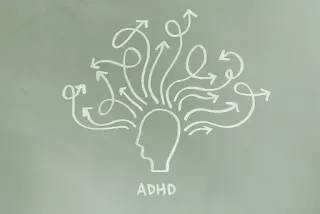Life of an adult female with unrecognized ADHD
ADHD, Attention Deficit Hyperactivity Disorder is a neurodevelopmental disorder that usually begins in childhood and persistently impacts adulthood. As the name says most common symptoms are Hyperactivity, and lack of attention. Some people may also experience issues with memory, depression, aggression, anxiety, mood swings, learning difficulties and some other behavioural, and cognitive issues. Children with ADHD are often misunderstood for their lack of attention as being lazy, rude and being called out for their hyperactivity.
However, the misconception is that people with ADHD are always hyperactive, impulsive and extroverted. ADHD looks different in women. Women with ADHD are not hyperactive/ impulsive, they are often disorganized, forgetful and introverted. Girls are often left unorganized/ undiagnosed because of the disparity in expression. Less hyperactivity and less disruptive behaviour in females with ADHD contribute to bias in identifying.
Due to various biological and societal norms, women with ADHD do not get proper intervention and are left untreated. ADHD affects day-to-day activities and it gets difficult for a grown-up who is trying to balance work and personal life. Being less attentive and shelled is often misunderstood as a personality trait of women. Women are expected to be quiet, organized, clean, and attentive to the events of life; disorganised women and forgetful women are always labelled as lazy rather than focusing on the root cause of the behaviour. Chirpy, over-talkative, and verbal aggression in girls is overlooked as puberty or genetics.
ADHD in girls is misdiagnosed as depression, anxiety or bipolar. Depression and anxiety could be the symptoms of ADHD, they are treated for only identified symptoms but the disorder is unseen. Undiagnosed ADHD affects the life of a woman at both home, social life and the workplace. Some of the symptoms of ADHD are worse and noticeable at places like school and work.
Wouldn't it be great to remember your loved ones' birthday, bake a cake for them or attend a party with utmost enthusiasm? As much as it sounds great, it's difficult for those with ADHD, especially for women. Since women with ADHD tend to be forgetful, and unorganised, they may even feel shy to interact with people at a party. Often, they are misunderstood as they don't care about their loved ones.
ADHD also affects their social life, as women are expected to behave, talk, and think in a certain way. Some women with ADHD come out to be very strong, and talkative which might reflect as they do not listen to others or do not allow others to talk. In a social conversation, it is always two-way. Some women are always looked at as tomboys, one with high energy, always busy which is hard for some people to keep up friendships or relationships with them.
Work-life demands a lot of attention, decision-making skills, mindfulness and being organised. Some women with ADHD lack those specific skills which affect their day-to-day activities at work. Piling up the desk with pending work, getting distracted because of colleagues, and working up late to focus on work are some of the hurdles at work.
A Little thing that is simple for a neurotypical can be a burden for an individual with ADHD. Many comorbid conditions come along with ADHD such as Drug addiction, Anxiety disorder, Eating Disorder, Mood disorders etc. Symptoms may not be necessarily the same for all women who have ADHD, the comorbidities may also vary based on the lifestyle and symptoms.
Parents and teachers should be well aware of the condition, symptoms and strategies to help them. It is always easy to label someone who has a mental health disorder; it's really important to be mindful and knowledgeable when one is surrounded by a person with ADHD. ADHD can be treated with therapy, medication, lifestyle changes, and proper accommodation at school and work.
Early Intervention, psycho-educating parents and people involved with the person with ADHD can help them go through their day-to-day activities.

